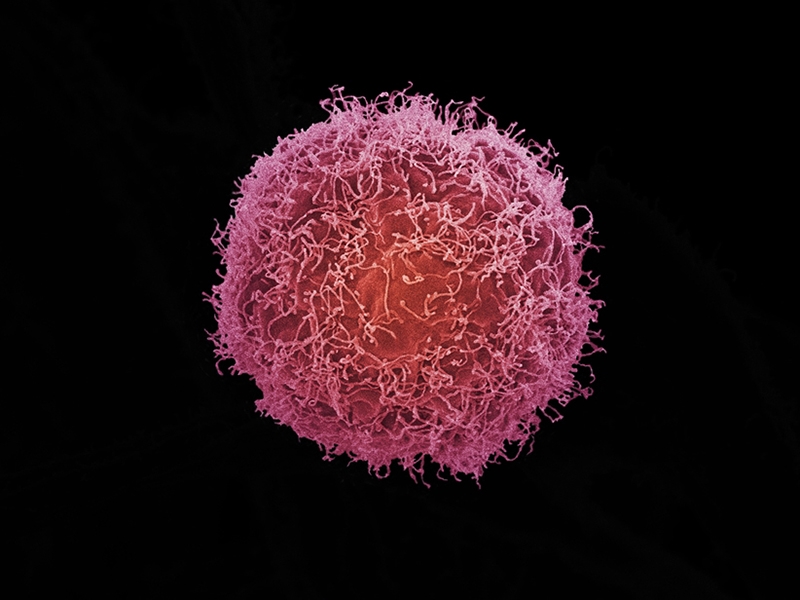As of January 2022, there were an estimated 18.1 million cancer survivors in the United States. This number is projected to rise to 22.5 million over the next decade. Even with improving cancer-related death rates, annual medical expenses for these patients will exceed $125 billion, according to the National Cancer Institute.
“Despite these dauting numbers, we are in the midst of a revolution in the way we understand, diagnose, treat and prevent cancer,” said Tim Muldoon, professor of biomedical engineering and founding member of the Department of Biomedical Engineering.
Muldoon will demystify and explore cancer and chronic disease research, along with the external factors in science, medicine and industry that influence innovation and care, during his public lecture “Cancer and Chronic Disease in the American Healthcare Ecosystem” Tuesday, Sept. 24, at 5:15 p.m. in Gearhart Hall Auditorium (GEAR 26).
The lecture will preview his spring 2024 Honors College Signature Seminar.
“Professor Muldoon's Cancer and Chronic Disease Signature Seminar possesses ‘star power.’ The last crew who experienced this amazing intellectual ride propelled themselves into top-tier medical and research schools, including Harvard. Don’t hesitate to sign up for this scholarly ride.”
In his seminar, Muldoon will guide students through questions like: How should we allocate resources to combat cancer? How can we better address healthcare disparities to improve outcomes? Are funding agencies prioritizing the right areas for treating an aging population and other chronic diseases?
Students in Muldoon’s seminar will have the chance to help shape the discussion topics around cancer and chronic disease based on their interests and experiences. The course will be interdisciplinary, inviting students from various colleges and disciplines to apply, as the universe around cancer care encompasses business, pharmaceuticals, public health and more.
“Everyone knows someone who has been affected by cancer or chronic disease,” Muldoon said, “and I’m sure everyone has a positive and negative story to tell in that regard. I want us to talk about things from the clinical, research and social perspective.”
The class will confront misconceptions in medical research and reflect on the progress made in treatment and outcomes.
“It’s not all doom and gloom,” Muldoon shares. “We’ve made huge strides, especially in the long-term cure rates of pediatric cancer. It’s not the binary disease that people are used to thinking about.”
SIGNATURE SEMINARS EXPLORE DIVERSE TOPICS
Cancer and Chronic Disease in the American Healthcare Ecosystem is one of two Honors College Signature Seminars scheduled for spring 2025. The other course offered is:
Animal Minds — taught by Ed Minar, professor of philosophy.
The dean of the Honors Colleges nominates top research faculty to participate in this program, and those selected to teach will become Dean’s Fellows in the Honors College.
Honors students must apply to participate, and those selected will be designated Dean’s Signature Scholars. The course application is posted online on the Signature Seminars web page. The deadline to apply is Thursday, Oct. 10, 2024.
ABOUT TIM MULDOON
Muldoon is a founding member of the Department of Biomedical Engineering at the U of A, joining the faculty as an assistant professor in 2012. He received his Ph.D. in Bioengineering at Rice University in Houston, Texas, in 2009. He received an M.D. from Baylor College of Medicine in Houston, Texas, in 2010. He then served as a postdoctoral research scientist with Elizabeth Hillman at Columbia University in New York City prior to joining the U of A.
He has authored 18 publications and over 35 conference papers to date. He has served as principal investigator on three National Institutes of Health research grants, including a recently completed Academic Research Enhancement Award (R15) from the National Cancer Institute for his work on developing multimodal microendoscopy and spectroscopy technologies.
He has also received the National Science Foundation CAREER award and currently serves as the director of the NSF-funded Biomedical Optics and Imaging Research Experience for Undergraduates (REU) program within the Department of Biomedical Engineering.
About the Honors College: The University of Arkansas Honors College was established in 2002 and brings together high-achieving undergraduate students and the university’s top professors to share transformative learning experiences. Each year the Honors College awards up to 90 freshman fellowships that provide $80,000 over four years, and more than $1 million in undergraduate research and study abroad grants. The Honors College is nationally recognized for the high caliber of students it admits and graduates. Honors students enjoy small, in-depth classes, and programs are offered in all disciplines, tailored to students’ academic interests, with interdisciplinary collaborations encouraged. All Honors College graduates have engaged in mentored research.
About the University of Arkansas: As Arkansas' flagship institution, the U of A provides an internationally competitive education in more than 200 academic programs. Founded in 1871, the U of A contributes more than $3 billion to Arkansas’ economy through the teaching of new knowledge and skills, entrepreneurship and job development, discovery through research and creative activity while also providing training for professional disciplines. The Carnegie Foundation classifies the U of A among the few U.S. colleges and universities with the highest level of research activity. U.S. News & World Report ranks the U of A among the top public universities in the nation. See how the U of A works to build a better world at Arkansas Research and Economic Development News.
Topics
Contacts
Shelby Gill, director of communications
Honors College
479-575-2024,
